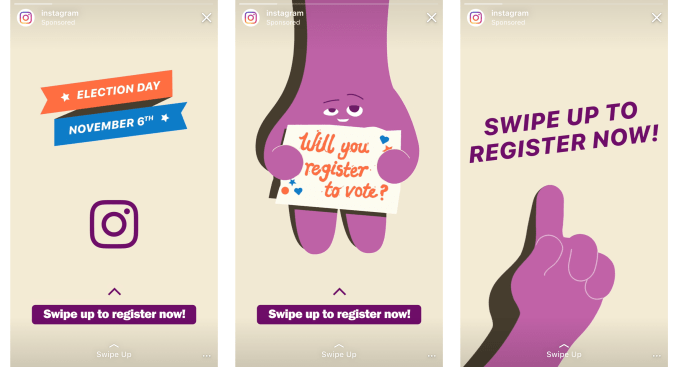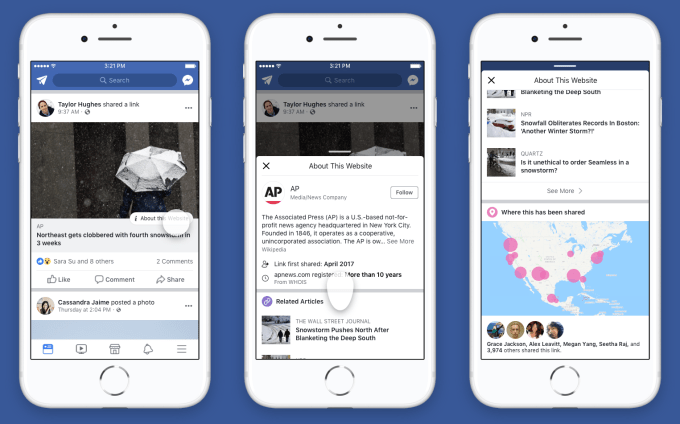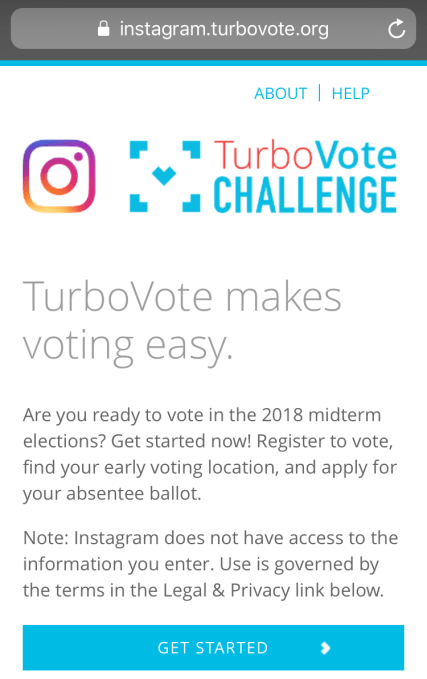
Facebook will push users to register to vote through a partnership with TurboVote, has partnered with the International Republican Institute and National Democratic Institute nonprofits to monitor foreign election interference and will publish a weekly report of trends and issues emerging from its new political ads archive. Facebook has also confirmed that its election integrity war room is up and running and the team is now “red teaming” how it would react to problem scenarios such as a spike in voter suppression content.
These were the major announcements from today’s briefing call between Facebook’s election integrity team and reporters.

Facebook’s voter registration drive will also partner with TurboVote, which Instagram announced yesterday will assist it with a similar initiative
[Update: Facebook also today announced that its context button designed to deter the spread of false news by giving people information about an article’s publisher is now expanding to appear on all links shared to the News Feed, not just articles. Alongside a Wikipedia blurb about the publisher if available, the context button will now also show the age of the domain. This could help users spot sketchy, recently-created news outlets or ones attempting to spoof the brand of an established outlet by using a slightly different URL. Beyond the US and UK, the context button is now expanding to Canada, Australia, New Zealand, and Ireland as well.]

Much of the call reviewed Facebook’s past efforts, but also took time to focus on the upcoming Brazilian election. There, Facebook has engaged with over 1,000 prosecutors, judges and clerks to establish a dialog with election authorities. It’s partnered with three fact-checkers in the country and worked with them on Messenger bots like “Fátima” and “Projeto Lupe” that can help people spot fake news.
 The voter registration drive mirrors Instagram’s plan announced yesterday to work with TurboVote to push users to registration info via ads. Facebook says it also will remind people to vote on election day and let them share with friends that “I voted.” One concern is that voter registration and voting efforts by Facebook could unevenly advantage one political party, for instance those with a base of middle-aged constituents who might be young enough to use Facebook but not so young that they’ve abandoned it for YouTube and Snapchat. If Facebook can’t prove the efforts are fair, the drive could turn into a talking point for congressional members eager to paint the social network as biased against their party.
The voter registration drive mirrors Instagram’s plan announced yesterday to work with TurboVote to push users to registration info via ads. Facebook says it also will remind people to vote on election day and let them share with friends that “I voted.” One concern is that voter registration and voting efforts by Facebook could unevenly advantage one political party, for instance those with a base of middle-aged constituents who might be young enough to use Facebook but not so young that they’ve abandoned it for YouTube and Snapchat. If Facebook can’t prove the efforts are fair, the drive could turn into a talking point for congressional members eager to paint the social network as biased against their party.
The partnerships with the Institutes that don’t operate domestically are designed “to understand what they’re seeing on the ground in elections” around the world so Facebook can move faster to safeguard its systems, says Facebook’s director of Global Politics and Government Outreach Team Katie Harbath. Here, Facebook is admitting this problem is too big to tackle on its own. Beyond working with independent fact-checkers and government election commissions, it’s tasking nonprofits to help be its eyes and ears on the ground.
The war room isn’t finished yet, according to a story from The New York Times published in the middle of the press call. Still under construction in a central hallway between two of Facebook’s Menlo Park HQ buildings, it will fit about 20 of Facebook’s 300 staffers working on election integrity. It will feature screens showing dashboards about information flowing through Facebook to help the team quickly identify and respond to surges in false news or fake accounts.
Overall, Facebook is trying to do its homework so it’s ready for a “heat of the moment, last day before the election scenario” and won’t get caught flat-footed, says Facebook’s director of Product Management for News Feed Greg Marra. He says Facebook is “being a lot more proactive and building systems to look for problems so they don’t become big problems on our platform.” Facebook’s director of Product Management for Elections and Civic Engagement Samidh Chakrabarti noted, this is “one of the biggest cross-team efforts we’ve seen.”

